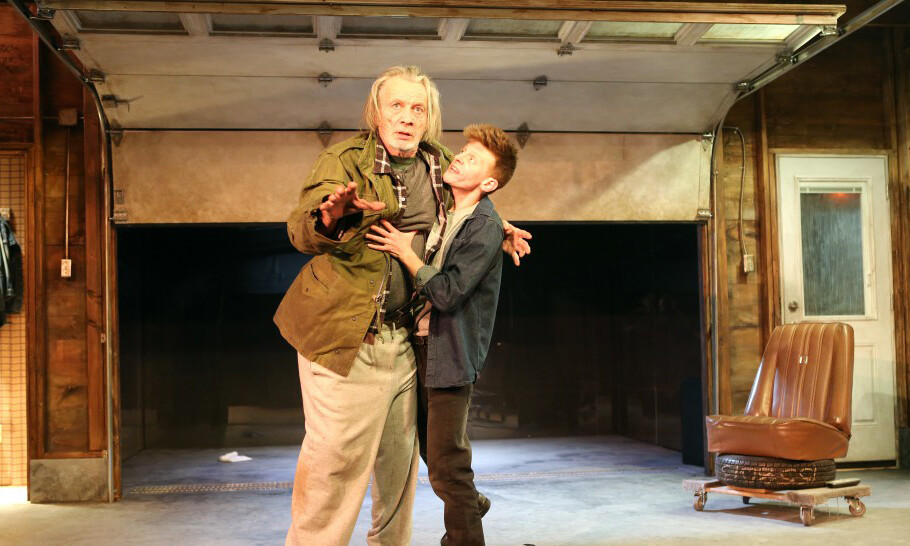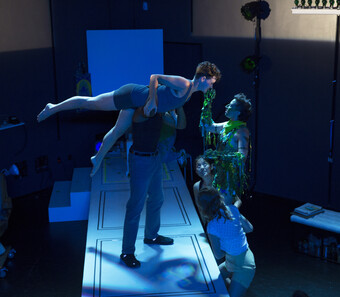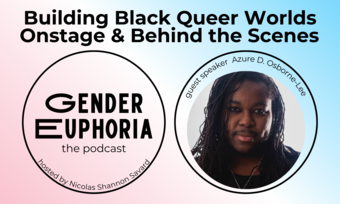I’ve noticed a troubling trend in the world of transgender theatre. When I hear about a show with a trans character, even starring a trans actor, I rush to see it, wondering, What new frontiers of gender and identity will we be exploring tonight? And, almost very time, the answer is: None.
I should specify before I continue that I am a transgender theatre artist, who, like many of my trans comrades, is a little starved for representation. We don’t really see ourselves in media—any media—and, when we are “represented,” it’s often a crude and hurtful facsimile of a trans person, usually played by a cis (= not trans) person.
The cis response to this is usually something along the lines of: Surely you should be satisfied seeing a trans character onstage!
Here’s the thing: I’m not. When I go see that same actor play the same trans character for the eighth time—the brave victim stuck in the wrong body—I don’t find myself feeling particularly seen. Regardless, these trans stories, which lack depth and personality, are the ones that get told. They’re uncomplicated, and they allow cis theatre artists and audience members to pat themselves on the back for being such good allies.
I believe that, at least among cis audiences, there is still a bit of mystery surrounding trans people. “Transgender” itself can be a difficult concept for some to comprehend. It feels dramatic and foreign—people changing everything about themselves and asking for others to use new and unfamiliar words. Although trans people have been around for thousands of years, our cultures and existences have been suppressed and erased, and we’ve ended up with a cis majority who know little to nothing about us. What they do know has usually been learned from mass media representations, which can be hit or miss. The cis theatre artist who wishes to tackle trans issues is challenged to feature a subject that most of their audience (assumedly) has little knowledge about. A difficult challenge, sure, but the answer cannot be to narrow the trans experience down to a couple of well-worn tropes that are easily digestible and understood.
It’s not the lack of knowledge on the audience’s part that bothers me; I acknowledge that we all have to start somewhere. But there is no excuse for a cis playwright to be lazy. As outsiders telling marginalized stories, cis playwrights have an obligation to make those stories honest and not dumbed down. They may be providing something new and exciting to cis audiences, but they are not doing the same for the trans people there. And we deserve daring, honest theatre that challenges us, on our terms, as well.
To many playwrights, the very existence of trans people is enough to make up an entire plot, because it’s just that strange. It often doesn’t end up mattering where we come from, who we love, what we think—to be trans is so new and bizarre that everything in the play must be dedicated to parsing that, with almost no attention given to the other important factors that make up our lives.
When I go see that same actor play the same trans character for the eighth time—the brave victim stuck in the wrong body—I don’t find myself feeling particularly seen.
This kind of fetishization does not have to be fueled by hatred to make it harmful. The wonderment in these shows places us on pedestals. Suddenly we become heroes, our very existence a testament to our fighting spirit. Our lives are depicted as an endless struggle just because we are trans. We can do no wrong—and that’s just not true. We are human beings, multidimensional and diverse, and our stories reflect that. My experience as a white, Jewish trans man is going to differ from the experience of a black, Muslim trans man, or a Swedish intersex trans woman, or a disabled Latinx nonbinary person who’s allergic to peanuts, etc. These aren’t meaningless identity combinations—these are all real people who exist. We are everywhere. We are unbelievably complex and unique, and that complexity needs to be present on the stage as well.
One of my favorite multidimensional trans characters can be found in the play Orange Julius by Basil Kreimendahl, a trans artist. Orange Julius tells of the relationship between a young trans man, Nut, and his father, Julius, who is a Vietnam War vet. Although the play stars a trans character, it goes much further than just the trials of trans life. It’s about the relationship between a father and a son—one that is tainted by illness, war, death, and uncertainty. We watch as Nut, both in real life and through his hyper-masculine proxy Ol’ Boy, tries to connect with his father as he cares for him. Yes, Nut struggles with being trans, but that is just one thread in the tapestry. What Kreimendahl does so well is weave together various threads—of trans struggle, of caring for loved ones, of surviving war and life after it—into one cohesive and heart-wrenching story.










Comments
The article is just the start of the conversation—we want to know what you think about this subject, too! HowlRound is a space for knowledge-sharing, and we welcome spirited, thoughtful, and on-topic dialogue. Find our full comments policy here
Just throwing out a question, what is the trans community going to say when I get my next play on stage with two trans lead characters, when I am a lesbian? I get really skittish when I read this kind of critique that makes me want to ditch the whole concept and cut the characters out completely.
I don't think the answer is ever to just cut and run, but to self-crit/examine. Are the characters fleshed out? Is there more to them than the fact that they are trans? Is their entire struggle just being trans? Have you spoken to trans people about the characters, or gotten feedback from trans people on it? Even if they aren't "perfect", whatever that means in theatre, what's important is that the artist listens and learns and has a genuine interest in respecting/doing right by trans people. And the trans community may be divided on it too! God knows we agree on very few things, if any.
TLDR - It's not "cis people can't write trans characters", it's "cis people need to work a little harder to write interesting trans characters".
Did Shakespeare know anything about ancient Rome, Verona or Ardenne? As writers, we walk into a character but we bring ourselves and our experiences to them. Any character that I put on stage is going to be ultimately a version of me. In the same way that I write about male characters when I am not male, and rich characters when I am not rich, or evil when I am not, they are all part of me. My motives in using trans characters is the same reason that I put any character on the stage, it is because I have something to say.
That's a actually a great analogy - Shakespeare did write about ancient Rome (when there were no ancient Romans left), and all those places (Verona, ancient Greece, etc.) that didn't have actual consequence to those he wrote about.
He also wrote a Jewish character, likely without having ever spoken to a Jew, working just off his own imagination and the things he had absorbed about them throughout his life in England. The result was an offensive and tired stereotype. One that was then used quite often, given that the folks it was written about were still around. Trans people are still around to see theatre, so why should we be satisfied with badly-researched cardboard cutouts of ourselves? Why should I sit in a dark theatre for 90 minutes watching something I can see the writer didn't put any thought into beyond reflecting themselves?
I wonder how many other trans playwrights clicked on this link, excited that there was a call for submissions for our plays. Womp womp
I'm not offering this up as an excuse... but I guess as a lesbian who's been around for over a half-century, my reaction to this piece was "Well, welcome to the club." I've seen it take over 50 years for gay and lesbian characters to begin to break out of banal stereotypes and lazy writing. And don't get me started on how writers and theaters handle women over the age of 40. Black actors understandably complain about their theatrical ruts (and they've been fighting their battles for hundreds of years.) Artists with physical disabilities justifiably remind us all that they are still largely invisible. Keep fighting! And if you figure out a way to speed up the process, let us all know please!